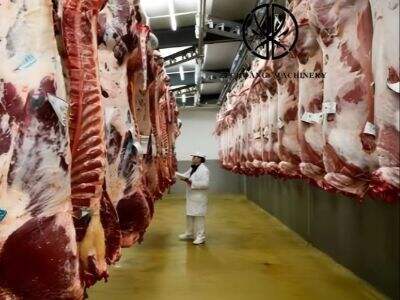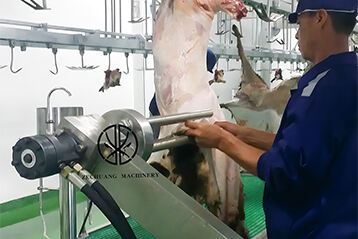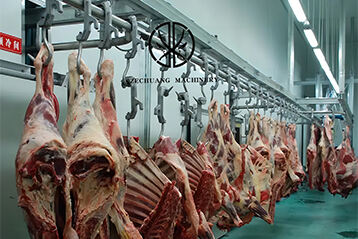What cow slaughterhouses are and what different cultures in the world understand as well tell what they are. you may know what a slaughterhouse is, or you may not. Slaughterhouse is a place where animals like cattle and other are killed to provide people's from there meat products. So, in this article, we will be learning more about cow Slaughtering Line and why people from different parts of the world have different perceptions towards them.
Cow Slaughter in a Global Way
The theme of cow slaughter is such that all people have their own views. There are some places where it is common to kill cows for eating. This is something that people are going for many years and family traditions also make it follows. In certain other countries there is no permission whatsoever and some action are performed but only for some religious process it allowed.
In India, cows are a very special animal and they hold sacred to large part of the population. This belief most often makes the majority of people to not able to kill cows across many parts of the country. In Hinduism, cows are considered to be in many ways equivalent to female human what this data reflects about Indian culture. On the contrary, it is also permissible to kill cows in the United States as well, and beef is a large part of many diets. It is a commercial industry of the specific state, and it provides food to majority of homes as cow slaughter is very general here. Cows can in some areas of the Middle East be killed for religious reasons earned during a ceremony, like at Eid. They have shown how different people from various cultures has their own perception about slaughtering of cow.
Different Cultures; Same Moral Dilemma
This question marks the basis of what is right and wrong in cow slaughter. It is known as a moral bind or predicament. Many people think that killing animals for food is immoral, yet others argue that it simply allows them to survive. Cows are sacred animals to some culture that believe that killing cows is sinful and wrong. Some cultures think cow is a holy animal and cows should not be killed for food while the other says, what the hell its just another animal on this planet; if you eat any other flesh cow’s will soon follow.
It would be an absurd imposition of our industrial bracket-based ontology to think of cows merely as meat. Cows make rich deposits in the ecosystems they occupy — and thanks to their rather catalytic methanogenic capabilities which we chide, global warming deniers can always point out far worse biological offenders. They also provide us with milk, cheese and living means to thousands of families in India. Culling cows for food can save many farmers and families,. Enqueue farmers ^Measurer and Packer But cultures where cows are venerated as sacred consider it their obligation to protect the beasts. Those with different beliefs evidently feel cows have a low value when it comes to determining who they might kill.
The Influence of Cow Slaughterhouses in The Society
Two Roles That Are Not Food For Man, But Serve To Slaughterhouses By zechuang machinery. They provide jobs and money from many people in the local economy in some areas. Remo brought him up by retorting:- Well, people do need to earn a living in slaughterhouses. This means a lot especially in areas where jobs are not that easy to find. In other places, though, cow slaughterhouse equipment is an environmental problem. One example of how human activity could affect the ecosystem is by contaminating water with waste that kills fish and plants in nearby freshwater.
Others are worried about the way animals are handled during slaughter. There are a lot of arguments over on living conditions for animals while they are still alive prior to being buthcered. Some people think that the animals do not have good conditions, and that their living is inhumane-not kind or fair. In the second case, people believe we need these places to grow abundant food for our burgeoning population. One argument they make is that slaughterhouses are the most efficient means of feeding many people.
Faith, Customs and Cow Slaughter
These are cow slaughterhouses a and very complicated subject because these necessarily include religion, tradition, ethics (i. e., all the values by which people decide what is right and wrong) For example, in India cow is a highly empowering animal and killing a cow is a sin (pronounced, which implies it is really wrong to do so.) It is considered blasphemous, according to some people so people believe that it goes against their religious beliefs.
Many people of other cultures consider killing cows as natural way of life or even killed for thousands of years. Cow slaughter is in this control of tradition very ingredient unmovable. It is a ritual for many who follow it and an attachment to the past of their forefathers. One the hardest things to later change is tradition because tradition is often something passed down from generation to generation.
Respect and disrespect Cow Slaughtering Views Around the Globe
At last, crux is: It depends on the region where you live to care about cow slaughter house. Various cultures have their own perspective of this view, and even within the same culture the philosophy on this may vary so much. There are some who agree in principle to cow slaughter as a necessary evil but wrong while the others oppose it outright.
Keep in mind that cows are multi-dimensional creatures, and the reasons why people believe what they do about cow slaughter are nuanced. These are inherent to agreeing on sensitive issues like cow slaughter. This is why a conversation on Cow slaughter house can get very dicey.
So this is the cow slaughterhouses of about all time, a comparative view from a number of different primitive tribes and nations. We also learned how religion, tradition and ethics intermix into how individuals regard this issue. It helps us to understand how it is complicated and why some many people around the world care.
 EN
EN
 AR
AR
 CS
CS
 DA
DA
 NL
NL
 FI
FI
 FR
FR
 DE
DE
 EL
EL
 HI
HI
 IT
IT
 KO
KO
 NO
NO
 PL
PL
 PT
PT
 RO
RO
 RU
RU
 ES
ES
 SV
SV
 TL
TL
 ID
ID
 LV
LV
 SR
SR
 UK
UK
 VI
VI
 SQ
SQ
 HU
HU
 TH
TH
 TR
TR
 AF
AF
 MS
MS
 SW
SW
 GA
GA
 CY
CY
 HA
HA
 LO
LO
 LA
LA
 MN
MN
 MY
MY
 KK
KK


/images/share.png)




